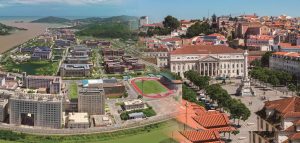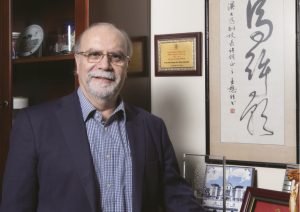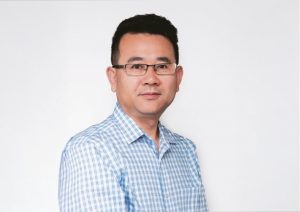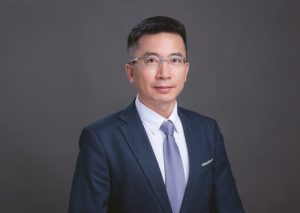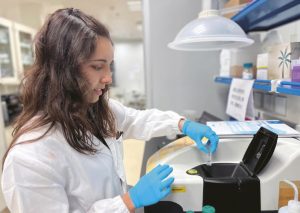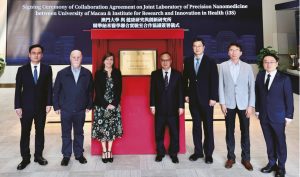Macao, with its unique history and cultural heritage, plays a pivotal role as a platform for exchange and cooperation between China and Portugal. Therefore, the University of Macau (UM), distinguished by its strong international character, has actively built bridges connecting academic institutions in China and Portuguese-speaking countries. In recent years, UM has forged deep partnerships with leading Portuguese institutions such as the University of Lisbon, the University of Coimbra, and the University of Porto, and has made significant progress in academic exchange, research collaboration, student exchange, the establishment of joint laboratories, and the launch of dual PhD programmes.
Establishing Long-Standing Partnerships
Prof Rui Martins, vice rector of UM, travelled from Portugal to Macao in 1992 with special permission from the University of Lisbon to pursue his academic aspirations overseas. Since that time, he has become a key figure in fostering exchange and cooperation between UM and Portuguese-speaking institutions. ‘UM shoulders the mission of linking mainland China, Macao, and Portugal,’ says Prof Martins, who has extensive experience and insight into Chinese and Portuguese cultures and academic collaboration.
UM’s ties with Portuguese institutions date back to the early days of its predecessor, the University of East Asia. As early as the 1980s, UM established a sister-university relationship with the University of Lisbon, marking the beginning of a long-term partnership. UM’s connections with the University of Porto and the University of Coimbra also have deep roots. According to Prof Martins, UM signed an agreement with the University of Porto in 1993 to conduct joint research and faculty exchanges. In 1995, UM, the University of Coimbra, and Beijing Foreign Studies University entered into a partnership to promote exchanges in research and education. Today, these partnerships have grown to include cutting-edge scientific research and joint talent development, among other areas.
Establishing Joint Laboratories
The latest cooperation agreement between UM and the University of Coimbra was signed in October 2023, leading to the establishment of the Joint Laboratory of Cognitive Aging. Prof Yuan Zhen, head of UM’s Centre for Cognitive and Brain Sciences, says, ‘This joint laboratory serves as an academic hub that brings together experts in cognitive neuroscience from both universities. We tackle critical questions such as the neural mechanisms of cognitive aging, early detection of pathological aging, and the relationships between the brain and cognition across the lifespan. We also engage in dynamic intellectual discourse through various joint research projects, student and faculty exchanges, and academic events. In addition, we plan to train doctoral students through joint programmes to foster academic innovation.’
In September 2024, another exciting partnership emerged as UM and Portugal’s Institute for Research and Innovation in Health (i3S) established the Joint Laboratory of Precision Nanomedicine. Prof Wang Ruibing, professor in UM’s Institute of Chinese Medical Sciences, who also leads the joint laboratory, says, ‘Precision nanomedicine is a revolutionary and cutting-edge research field with broad application prospects. The joint laboratory is dedicated to developing advanced drug delivery systems, including stimuli-responsive nanocarriers, micro/nanorobots for targeted drug delivery, and cancer immunotherapy. Our ultimate goal is to provide patients with personalised, innovative precision therapies.’
Offering Dual PhD Programmes
Continuing the tradition established 25 years ago of awarding dual PhD degrees with the Instituto Superior Técnico of the University of Lisbon, UM and higher education institutions in Portugal have taken further steps to promote joint talent development. UM and the University of Porto have launched a dual PhD programme that capitalises on the shared expertise and advanced facilities of the Joint Laboratory of Precision Nanomedicine. The first cohort includes Sofia Costa, a University of Porto student, whose supervisor is Prof Wang Ruibing of the joint laboratory.
In 2024, Sofia arrived in Macao with a thirst for academic excellence. Her research focuses on micro/nanomotor synthesis and the development of tumour-on-a-chip drug screening platforms, with a particular emphasis on exploring nanomedicine as a novel alternative treatment for osteosarcoma—a rare childhood bone cancer. She believes that the dual PhD programme combines the strengths of both prestigious universities and can help her achieve her research objectives. For Sofia, coming to Macao is more than an opportunity to enhance her academic prowess—it is a cross‑cultural journey. ‘When tackling complex research challenges, researchers from different cultural backgrounds can offer unique perspectives that lead to innovative solutions. I’m gradually building my research network in this inclusive, collaborative environment,’ she says.
Additionally, in December 2023, UM signed an agreement with the University of Lisbon for a dual PhD programme, initiating cooperation in the training of high-level talent in cutting‑edge fields such as microelectronics, robotics, and ocean science. The programme opens an academic gateway that transcends intellectual and geographical boundaries. Prof Martins, who maintains deep ties with the University of Lisbon, says, ‘The two universities are like comrades‑in‑arms, recommending outstanding doctoral students for the dual PhD programmes. Together, we are nurturing high-calibre talent, contributing to academic research, and enhancing the depth and breadth of academic cooperation.’
Sending Students to Study in Portugal
UM continues to strengthen its student exchange initiatives with higher education institutions in Portugal, offering students diverse learning experiences across various disciplines. Thirteen Portuguese institutions—including the University of Coimbra and the University of Porto—provide immersive learning platforms for UM students. Every year, UM sends students to Portugal through several exchange programmes. Currently, many UM students are studying in Portugal—12 through exchange programmes, 24 in the Bachelor of Law programme (conducted in both Chinese and Portuguese), and 32 via the Department of Portuguese’s Study Abroad Programme.
The linguistic and cultural environment plays a crucial role in language learning. As the largest Portuguese teaching body in Asia, UM’s Department of Portuguese sends students to Portugal every year for linguistic and cultural immersion. Mio Weng Kei, a fourth-year student of Portuguese studies, spent a year studying at the University of Coimbra—an experience that had a profound impact on her. She recalls, ‘In class, I had the opportunity to practice impromptu speaking and give presentations, and my language skills were greatly improved in a Portuguese-speaking environment. Outside the classroom, I immersed myself in Portuguese culture, made friends from all over the world, and broadened my horizons through cultural exchange. This journey gave me the courage to explore different possibilities in life.’
Portuguese law plays an important role in Macao’s legal system. To deepen students’ understanding of the origins and development of Macao law, UM’s Faculty of Law offers students enrolled in the five-year Bachelor of Law programme (conducted in both Chinese and Portuguese) the opportunity to study in Portugal. Lam Weng Lam, a fourth-year law student, shares her enriching experience at the University of Porto: ‘Discussion is an important part of the classes at the University of Porto,’ she says. ‘The professors there encouraged us to express our opinions, and our understanding of knowledge was deepened through intellectual exchange. In addition, learning goes beyond classroom lectures—we explored Portugal’s history and culture through weekly extracurricular activities. We also integrated theoretical knowledge with practical experience through written assignments.’
Deepening Cooperation Among Alliance Members
UM holds a prominent position in the Portuguese‑speaking academic community, not only as an invited member of the Council of Rectors of Portuguese Universities (CRUP), but also through its leadership role in the Association of Portuguese Speaking Universities (AULP). The university has served as president of AULP (2014-2017) and has held multiple terms as vice president (2005-2014, 2021-2027). Furthermore, in 2021 and 2022, UM initiated the establishment of several academic alliances: the Academic Library Alliance between Macao Special Administrative Region and Portuguese‑speaking Countries, the Academic Library Alliance for Portuguese Language Resources between Macao Special Administrative Region and Mainland China, and the China-Portuguese Speaking Countries Ocean Research Alliance. Through these platforms, the university further leverages its strengths, actively participates in various academic events, fosters cooperation and exchanges among Portuguese‑speaking institutions, and promotes Portuguese-language education on a global scale.
In June 2026, UM will host the 35th annual meeting of AULP, further strengthening its role in academic cooperation with Portuguese-speaking institutions. Prof Martins says, ‘Being selected to host this meeting again marks a milestone in Macao’s emergence as a hub for academic exchange in the Portuguese-speaking world. We look forward to bringing together higher education experts from Portuguese‑speaking countries and regions to explore ways to strengthen the international cooperation platform between China and Portuguese-speaking countries, and promote cooperation in education and research. UM will continue to expand its partnership network with higher education institutions around the world, and contribute to international education and research development.’
Text: Bell Leong, Davis Ip, Senior UM Reporter Wang Chuyue, UM Reporter Tracy Li
Photo: Jack Ho, with some provided by the interviewees
English Translation: Winky Kuan
Source: UMagazine ISSUE 31


